At a recent meeting which John Oliver arranged we tried to define some key terms for the creative and digital theme and the inital viewpoint was that the ‘digital economy’ was a narrower definition focusing mainly on enterprise and ‘doing’, however this definition of the digital economy from the The Research Council UK is broader: “the novel design or use of information and communication technologies to help transform the lives of individuals, society or business (RCUK website accessed February 2011).”
Tagged / BU research
Excellent BU Research Highlighted in New Report

Big Ideas for the Future
Thursday’s theme is Big Ideas for the Future and a research project being undertaken by Prof Alan Fyall and Dr Heather Hartwell has been highlighted in a new report out today. The report produced by Research Councils UK (RCUK) and Universities UK (UUK) called Big Ideas for the Future looks at 100 ground breaking pieces of research from all fields, including science, social sciences, engineering, and the arts and the humanities, that is taking place in UK higher education at the moment and what it will mean for us in 20 years time. The report is narrated and backed by high-profile celebrity academics such as Professor Lord Robert Winston, Dr Alice Roberts and Professor Iain Stewart.

The BU research team are exploring the relationship of co-locating a tourism and public health strategy, in particular examining the positioning of seaside towns in Southern England. The Big Ideas for the Future Submission prepared by the team and containing more information on the research is available by clicking the link.
Sustainable methodology of conserving large historic vehicles in the museum environment
Dr Zulfiqar Khan, School of Design, Engineering and Computing, discusses the work undertaken by BU academics and the Tank Museum to conserve large military vehicles…
 The Tank Museum Bovington has the largest collection of military tanks from World War 1, 2 & recent. These historic military vehicles and all other large objects have always been key entities, which provide a wealth of information and insight into the past design process, design methods, materials and manufacturing techniques. These rare & historic collections are valuable assets for our present and the future generation.
The Tank Museum Bovington has the largest collection of military tanks from World War 1, 2 & recent. These historic military vehicles and all other large objects have always been key entities, which provide a wealth of information and insight into the past design process, design methods, materials and manufacturing techniques. These rare & historic collections are valuable assets for our present and the future generation.
These historic vehicles like any other museum artefacts are associated with deterioration due to aging mechanisms such as corrosion, stress corrosion and fatigue crack propagation and wear in the interacting surface.
Large military vehicles such as military tanks were exposed to extreme physical and environmental conditions during the war, in addition after the war the vehicles were left unattended for an unidentified period in the uncontrolled environment resulting accelerated aging mechanisms.
Corrosion is one of the growing persistent problems in the military vehicles in the Tank Museum at Bovington. The historic vehicles are stored in the museum in two distinct controlled and uncontrolled environments with a transitional mode when vehicles move between the two. Varying environmental conditions together with operational factors pose a significant risk to the vehicles.
To preserve these vehicles in a valuable state for the benefit of the society, sustainable conservation techniques are required to slow down or suspend the deterioration within these historic vehicles.
Extraordinary interests and efforts of the Director of The Tank Museum at Bovington Mr. Richard Smith and Professor Mark Hadfield, Director Sustainable Design Research Centre (SDRC) at Bournemouth University lead to the design of a research project between BU and the Tank Museum. Mr Adil Saeed has been conducting important research under the supervision of Dr. Zulfiqar Khan co-director SDRC, Dr. Nigel Garland and Professor Mark Hadfield as mentor.
 Adil was recently invited as guest speaker by Forensic Institute Cranfield University at Shrivenham where his guest lecture was well attended and received. In addition Adil has also presented the outcome of the ongoing research in the Department of Materials at Oxford University, where member of the research consortia and Oxford university staff attended the presentation.
Adil was recently invited as guest speaker by Forensic Institute Cranfield University at Shrivenham where his guest lecture was well attended and received. In addition Adil has also presented the outcome of the ongoing research in the Department of Materials at Oxford University, where member of the research consortia and Oxford university staff attended the presentation.
Recent research outcomes and results were also presented in a paper at an international conference of Society of Tribologists and Lubrication Engineers (STLE) in May 2011 at Atlanta, Georgia. STLE is highly reputable organisation with members around the world. The conference in May attracted around 400 papers with well over 1000 delegates, 70 multinationals industrial participants and 40 student posters.
The aims of the research are to indentify the aging mechanisms such as corrosion, stress corrosion and fatigue cracking, failure due to static and dynamic stresses including the role of residual stresses, deterioration in the interacting components and other potential risks in the historic vehicles through non-destructive methods and develop sustainable methodology for the preservation of these vehicles in different museum environments.
Phytoplankton research aboard R.V. Cefas Endeavour
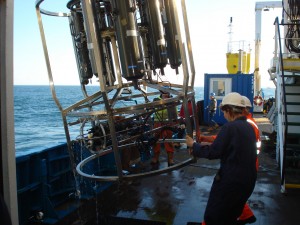 Dr. Dan Franklin and Deborah Steele, School of Applied Sciences, have joined forces with scientists from across Europe on a research cruise in the North Sea exploring the abundance and growth of plant cells (phytoplankton).
Dr. Dan Franklin and Deborah Steele, School of Applied Sciences, have joined forces with scientists from across Europe on a research cruise in the North Sea exploring the abundance and growth of plant cells (phytoplankton).
The research team conducted their study aboard the R.V. Cefas Endeavour, using specialised optical instruments called flow cytometers, which analyse thousands of cells per second.
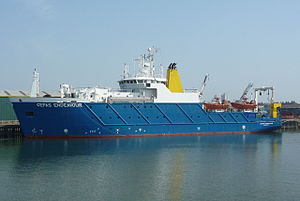 Using this technology the scientists have built up a comprehensive picture of what grows where and how productive the different cells are.
Using this technology the scientists have built up a comprehensive picture of what grows where and how productive the different cells are.
 This data will improve the way plant growth is seen by satellites and will help to map out fish production, which is ultimately dependent on phytoplankton growth.
This data will improve the way plant growth is seen by satellites and will help to map out fish production, which is ultimately dependent on phytoplankton growth.
Dan Franklin said: “We were exceptionally lucky with the weather and enjoyed calm seas throughout the cruise. Our track took us North from Lowestoft, across to the Dogger Bank, east into Dutch coastal waters before returning to Lowestoft via the Greater Gabbard wind farm in the Thames estuary. The fact that we had calm seas made the lab work much easier. I found the habitat complexity and biodiversity of the North Sea a revelation – everywhere was different. When not working long hours in the laboratory, we were fortunate to see plenty of wildlife such as whitebeak dolphins, various seabirds such as gannets and guillemots, and possibly minke whales and orcas.”
 The research trip was made possible by the generosity of CEFAS, the government laboratory responsible for monitoring fish stocks, promoting the sustainable use of marine resources and improving the marine environment. BU extends thanks to CEFAS for this opportunity.
The research trip was made possible by the generosity of CEFAS, the government laboratory responsible for monitoring fish stocks, promoting the sustainable use of marine resources and improving the marine environment. BU extends thanks to CEFAS for this opportunity.
You can view an excellent video of dolphins from the trip below:
httpv://www.youtube.com/watch?v=-DhzSaq_KS4
Cross BU themes – big but still narrow?
Outlines for the big themes are unfolding, or are they? Let me share some observations. Several weeks ago, the professoriate had an immensely fruitful brainstorming meeting to discuss, among other things, how we can take forward the promotion of cross-University research collaboration and which big research themes would be suitable given their current representation in the funding landscape and their contribution towards societal need. Of the impressive and broadly supported list that emerged, three themes have so far been tackled: Technology and Design, Ageing, and Health & Wellbeing. Their recent descriptions on the research blog, however, reveal what I think may turn out to be a fundamental dilemma. Those three themes, the way they are outlined, can still be run by their home Schools alone and look like the continuation of big themes that were in existence already before we started to brainstorm rather than the roadmap to a wider integration of thoughts and people. I hasten to add here that I hold up my hands for not having engaged enough myself with two of the themes that my area of expertise can contribute to, but my impression is that there may be more people like me out there who just need that little kick. Therefore, for the penny it is worth, here are my suggestions for broadening out the themes on ageing and health & wellbeing.
The ageing society is at the fore, and will continue to be so for generations to come. However, do we trace old age back in time – and by that I mean from prehistory well into post-medieval periods? Do we settle happily with the perpetuated notion that people in the past all died young? How would a better understanding of the size and importance of the elderly cohort in past societies change our perception of old age today? How can we interrogate the most immediate source material to learn about humans in the past – their skeletal remains? Biological Anthropology (or Bioarchaeology) is set up to make the contribution here. First of all, dying young was by no means everybody’s fate. Not infrequently, people lived to respectable high age, comparable with, say, that during the Victorian period (once they survived infancy and early childhood). Vastly improved methods of age assessment from human skeletal remains now provide an increasingly clearer picture of life and death in the past. This information can be most beneficially used to inform research on the life course, differential mortality and patterns of longevity for girls and boys, women and men, in the context of prevailing socio-cultural, political and economic circumstances. I am sure; this can strike a chord with the outline on the ageing theme as it stands.
In a similar vein, health & wellbeing has for a long time concerned biological anthropologists. Palaeopathology is one of the prominent and rapidly expanding sub-fields of the discipline. Using sound, clinically-informed diagnostic approaches, patterns of disease (infectious, metabolic, degenerative, dental, neoplastic etc.) and evidence for treatment and care of the infirm can be reconstructed that provide a fascinating insight into living conditions and ambient socio-ecology of times past. Naturally, this also feeds back into the Ageing theme, as morbidity is one of the prime causative factors of differential mortality. Palaeopathological diagnosis extends into deep time as well and extends as far back as to include our hominin ancestors who were all but exempt from chronic disease that left traces of skeletal alterations.
I am aware that these two sketches may go too far for some, but I am at the same time convinced that a holistic approach, which explicitly includes the past and which embraces both biological and social sciences, will be able to contribute to a more comprehensive understanding of two defining and prominent themes that have a strong pedigree at BU. All comments welcome.
BU Research Impact event is a success!
 Last Friday BU held an internal Research Impact event to share the success of the excellent research that has been undertaken by BU academics. The focus of the event was on how this research has had an impact outside of academia, for example an impact on society, the economy, quality of life, culture, policy, etc.
Last Friday BU held an internal Research Impact event to share the success of the excellent research that has been undertaken by BU academics. The focus of the event was on how this research has had an impact outside of academia, for example an impact on society, the economy, quality of life, culture, policy, etc.
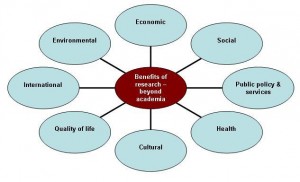
 For the forthcoming REF2014 BU will be required to include a number of research impact case studies as part of the submission. This is a new element to the REF (previously the RAE) and the HE sector has been grappling with the concept of impact for a number of years now.
For the forthcoming REF2014 BU will be required to include a number of research impact case studies as part of the submission. This is a new element to the REF (previously the RAE) and the HE sector has been grappling with the concept of impact for a number of years now.

The event, attended by over 75 BU staff, opened with a presentation from Prof Matthew Bennett (Pro Vice Chancellor – Research, Enterprise and Internationalisation) on BU’s future research strategy, planning for the REF, and how to develop and evidence research impact.
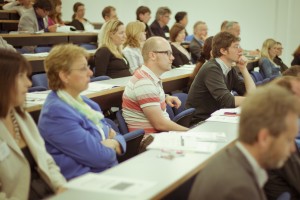 Part of the presentation focused on the BU Research Themes which are currently being identified and defined through academic consultation via the Research Blog. This is still in the early stages but Matthew presented the ten draft themes that are emerging. You can comment on the emerging themes here.
Part of the presentation focused on the BU Research Themes which are currently being identified and defined through academic consultation via the Research Blog. This is still in the early stages but Matthew presented the ten draft themes that are emerging. You can comment on the emerging themes here.

There were 35 impact case studies presented in total with most units of assessment (UOAs) presenting three case studies. At the end of each presentation members of the audience critiqued the case study and offered advice as to how the strengthen and maximise the impact claim.
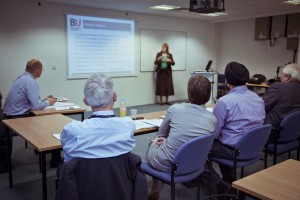 Attendees were encouraged to go to impact case study presentations from different UOAs/Schools to find out about research that is undertaken in different areas of the University. Stronger impact case studies can also be developed with input from different disciplines.
Attendees were encouraged to go to impact case study presentations from different UOAs/Schools to find out about research that is undertaken in different areas of the University. Stronger impact case studies can also be developed with input from different disciplines.
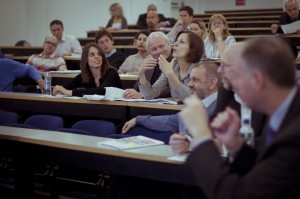 The event was also attended by key staff from Marketing & Communications who will be working with UOA Leaders to develop and enhance impact case studies between now and the REF submission in autumn 2013.
The event was also attended by key staff from Marketing & Communications who will be working with UOA Leaders to develop and enhance impact case studies between now and the REF submission in autumn 2013.
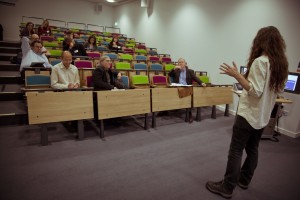 There has been much positive feedback received from attendees and we are considering whether this should now be an annual event, celebrating the success of BU research and its benefit to society.
There has been much positive feedback received from attendees and we are considering whether this should now be an annual event, celebrating the success of BU research and its benefit to society.
 Many thanks to all the presenters and attendees, and everyone who supported the event and made it such a success! 😀
Many thanks to all the presenters and attendees, and everyone who supported the event and made it such a success! 😀
We are now seeking feedback on the impact case studies presented. These are all available on the I-drive (I:\CRKT\Public\RDU\REF\REF event May 2011\impact case study presentations). Please could you email your feedback to Anita Somner in the Research Development Unit by Friday 3 June. Anita will then anonymise and collate the feedback and share it with the UOA Leaders.
For further information on impact see the impact pages on the HEFCE website or our previous BU Research Blog posts on impact.
BU research-based film to be directed by Josh Appignanesi
 Rufus Stone, a film by Josh Appignanesi
Rufus Stone, a film by Josh Appignanesi
A film about love, sexual awakening and treachery, set in the bucolic countryside of south west England, and viewed through the lens of growing older.
Josh Appignanesi, London-based filmmaker, script writer and director, has been chosen to direct a short film based on three years of research at Bournemouth University. The film, Rufus Stone, will tell the story of being gay and growing older in the British countryside.
Appignanesi recently directed and script edited the comedy feature film, The Infidel, written by David Baddiel and starring Omid Djalili and Richard Schiff, was released internationally in Spring 2010. He has written and directed several short films, most notably Ex Memoria (2006) which stars Nathalie Press and Sara Kestelman in a study of a woman with Alzheimer’s disease, funded by the Wellcome Trust; and Nine 1/2 Minutes (2003), a romantic comedy starring David Tennant.
Rufus Stone is to be produced as the key output of the three-year research project, “Gay and Pleasant Land? – a study about positioning, ageing and gay life in rural South West England and Wales “. The Project is a work package in the New Dynamics of Ageing Project, “Grey and Pleasant Land?: An Interdisciplinary Exploration of the Connectivity of Older People in Rural Civic Society” and funded by the British Research Councils.
Dr Kip Jones, Reader at the School of Health & Social Care and the Media School, who is the project’s Principal Investigator and Executive Director of Rufus Stone said, ‘We are very fortunate to secure Appignanesi’s involvement in this important output resulting from our three year’s of research efforts. Our hope is that the film will dispel many of the myths surrounding ageing, being gay and life in British rural settings. By engaging Appignanesi, the film and the results of this important, in-depth research will have significant impact on a wide variety of audiences’.
Champions Answer the Call!
 Several champions have stepped forward to help define the BU Research Themes. You may recall I asked for people to help frame these themes and encouraged as many people as possible to step forward with their thoughts. In fact the more views we have for each theme the more debate we can generate.
Several champions have stepped forward to help define the BU Research Themes. You may recall I asked for people to help frame these themes and encouraged as many people as possible to step forward with their thoughts. In fact the more views we have for each theme the more debate we can generate.
To help this debate we are posting the detail from the templates on a special part of blog – the Themes page. I encourage everybody to engage and to comment on the text as it is posted. If you feel inspired then fill in a template as well! The more people that get involved with this debate the stronger the definition of each research theme will be. So please have your say!
For the template, please see my previous Research Themes post.
Matthew Bennett
PVC (Research, Enterprise and Internationalisation)
Champions Answer the Call!
Several champions have stepped forward to help define the BU Research Themes. You may recall I asked for people to help frame these themes and encouraged as many people as possible to step forward with their thoughts. In fact the more views we have for each theme the more debate we can generate. 
To help this debate we are posting the detail from the templates on a special part of blog – the Themes page. I encourage everybody to engage and to comment on the text as it is posted. If you feel inspired then fill in a template as well! The more people that get involved with this debate the stronger the definition of each research theme will be. So please have your say!
For the template, please see my previous Research Themes post.
Matthew Bennett
PVC (Research, Enterprise and Internationalisation)
Search for a Champion? Or BU Research Themes
Thank you to all those people who responded to the online questionnaire about the BU Research Themes. There were 273 responses! On this basis we can reduce the short list of twelve societal themes down to ten as set out in the briefing paper (available from – I:\CRKT\Public\RDU\Research themes\Paper.docx). The ten are:
- Health and wellbeing
- Recreation and leisure
- Culture and society or Society & Social Change
- Environmental change and biodiversity
- Green economy and sustainability
- Creative and digital economies
- Aging
- Learning and public engagement
- Entrepreneurship and economic growth
- Technology and design
We urgently need some champions to ‘flesh-out’ these themes to help scope them and allow us to ‘road test’ them further. I am looking for as many views as possible for each theme; just fill out the template (available from – I:\CRKT\Public\Research themes\Form.doc) and e-mail it back to me. The idea is to then distill these views and produce a scope for each; if there are no champions forthcoming then we may be able to reduce the list further. I need the templates back by the 27 May if possible; thank you!
Matthew Bennett
PVC (Research, Enterprise & Internationalisation)
(The documents are saved to the I-drive. If you are on-campus then you need to copy and paste the file pathway into an internet browser. If you are unable to access them please contact Julie Northam who will email you the documents).
Market Research Group Update and Overview
C urrent news: we have just moved our data entry facility to Talbot Campus reuniting the group on one site (DG10, ground floor) we have also updated our scanning equipment and software to make data processing faster and more accurate. Some good teamwork with IT services and Estates made the move possible, while handling a record amount of data for this time of year.
urrent news: we have just moved our data entry facility to Talbot Campus reuniting the group on one site (DG10, ground floor) we have also updated our scanning equipment and software to make data processing faster and more accurate. Some good teamwork with IT services and Estates made the move possible, while handling a record amount of data for this time of year.
Our ongoing projects include:
- Dorset County Council panel surveys, providing data for the ‘Big Society’ and various staff surveys
- RDO European Time Share research.
- Data processing for two Bangor University, healthcare research projects with Health and Social Care.
- Data processing for Kings College London, healthcare research with Health and Social Care.
- Renaissance South East – Research into museum and gallery visits by primary and secondary school children in the SE region.
- Data processing and analysis for North Staffordshire NHS, Maternity Patient Surveys a joint project with Health and Social Care.
- The National Trust Countryside visitor research – a survey of 60 countryside areas managed by the organisation.
- The National Trust visitor research – a survey of 180 properties in the United Kingdom, providing monthly market intelligence and feedback to properties and analysis to guide strategic decision making at a national level. The research includes and investigation of specific topics including, community engagement and drivers of visitor enjoyment.
- Countryside and leisure research, sponsored by the National Trust to investigate drivers of countryside visit behaviour and motivation.
- Hindhead Common, Surrey, impact of road new road route and tunnel.
- Wareham St Martin Community research project this will provide analysis feedback for the development of community projects.
- Research support for the Digital Hub HEIF 4 research managed by Philip Alford.
- Research support for the GIS HEIF4 research programme managed Mark Dover, Applied Sciences
- Research support for the Boscombe Surf Reef Project managed by ICTHR and Applied Sciences
The value of projects in the ‘order book’ at present is around £400,000 but of course this value is much enhanced by the value of case studies and research material to support the curriculum.
We also have a number of bids in progress including Bournemouth Arts Festival, the Pembrokeshire Tourism Survey and research for the Northern Constabulary.
Vice-Chancellor’s Award: Research/Enterprise Project of the Year
 The Design Simulation Research Centre (DSRC) in the School of DEC won the Vice-Chancellor’s award for the best research/enterprise project. The research, led by Prof Siamak Noroozi, Dr Philip Sewell and Bryce Dyer, is detailed below.
The Design Simulation Research Centre (DSRC) in the School of DEC won the Vice-Chancellor’s award for the best research/enterprise project. The research, led by Prof Siamak Noroozi, Dr Philip Sewell and Bryce Dyer, is detailed below.
Members of the DSRC have used the results of previous research, funded by EPSRC and the medical charity REMEDI, to develop a research collaboration with Chas A Blatchford & Sons Ltd, the UKs leading prosthetics supplier. This has resulted in the team being awarded an EPSRC CASE Award (£86k) to design and develop a ‘Smart Socket’ to provide lower-limb amputees with increased mobility and improved quality of life. This collaboration has also led to the development of research to evaluate the performance of prostheses used by athletes in elite sport.
The underlying technology developed has other applications in civil, aerospace and marine engineering resulting in the initiation of two research projects with BAE Systems (PhD matched-funding – £26k and an EPSRC CASE Award – £95k).
IP rights have been negotiated with both companies meaning that a proportion of the income generated form any products developed will come to BU.
The research into the ‘smart socket’ and prosthetics fit has seen widespread public interest as the socket will help soldiers returning to active duty who had been injured in combat. This has resulted in the following publications in the international press:
– Soldiers could get back to active duty with the help of a ‘smart’ prosthesis” was published in the Guardian, January 2011.
– Ahhh…Comfort! UK Research Takes Next Generation “Smart Limb” to New Level” was published in the International Magazine OandP Edge (Vol. 9, No. 5), May 2010.
– Amputee mobility fix is socket science” was published in the Engineer, February 2010.
The parallel stream of research in the ethical use of sports prostheses saw one of its researchers invited to join the International Paralympic Commitee Sports Equipment Working Group. This advises on legislation of equipment used by athletes at the Paralympic Games. Along with this, invitations in this area resulted in several keynote speeches on the centre’s research at international conferences in both Germany and Spain during 2010. The team won the research prize at the Paralympics GB National Conference based on this research.
The findings from both projects and the resultant innovations will inform an area which has seen little attention historically. As a result of this research the team was nominated for ‘Outstanding Engineering Research Team of the Year’ at the Times Higher Education Awards in 2010.
The research into prosthetics fit and the smart socket will potentially transfer into widespread practitioner health practise through Blatchford’s 30 UK prosthetic centres. As a result this will influence how amputees are rehabilitated both from treatment within the NHS but also specialised private clinics such as Headley Court which addresses military personnel both retired or seeking return to service.
The research into the prostheses in sport has resulted in across school collaboration between DEC and the School of Tourism. This relationship investigated novel ways of assessing amputee motion. One of the researchers was invited to join a working group within the International Paralympic Committee which will help inform the sports stakeholders and the wider community ahead of the 2012 London Paralympic Games.
Congratulations to the Design Simulation Research Centre! 😀
HEFCE REF event at BU – register now!
The Graduate School story part I…
Professor John Fletcher founded BU’s Graduate School in 2002. Here he reflects on what life was like before the Graduate School and where we have come to so far…
 This blog is a reflection of the BU Graduate School story so far as the first incarnation of the Graduate School makes way for a new vision. When I was asked to set up the Graduate School in November 2002 as 0.2FTE of my time, it was in the wake of two RAEs where BU had been criticised for its lack of institutional support of its PGRs and a stream of complaints from our postgraduate researchers via the Student Union. The first step was to examine the processes and systems in place across both campuses which quickly revealed that the seven Schools had seven different sets of processes and systems and, even more challenging, it transpired that we had somewhere between 80 and 147 PhD students but nobody quite knew how many. When looking at the qualification rates at that time BU was only managing to get 11% of its PGRs through within 4 years and some researchers had been registered for more than 13 years! Eight years on the Graduate School has implemented a Code of Practice and a set of processes that are now common across BU’s six Schools, overseen the introduction of new and innovative doctoral programmes and help improve our qualification rates. The systems that the Graduate School has put in place were deemed to be so effective that members of the panel that came to BU for the institutional audit contacted the VC to ask if they could adopt the BU model for their own institution. BU was also one of the first handful of universities to introduce a credit bearing training programme for its supervisors, something that is now becoming commonplace across the sector.
This blog is a reflection of the BU Graduate School story so far as the first incarnation of the Graduate School makes way for a new vision. When I was asked to set up the Graduate School in November 2002 as 0.2FTE of my time, it was in the wake of two RAEs where BU had been criticised for its lack of institutional support of its PGRs and a stream of complaints from our postgraduate researchers via the Student Union. The first step was to examine the processes and systems in place across both campuses which quickly revealed that the seven Schools had seven different sets of processes and systems and, even more challenging, it transpired that we had somewhere between 80 and 147 PhD students but nobody quite knew how many. When looking at the qualification rates at that time BU was only managing to get 11% of its PGRs through within 4 years and some researchers had been registered for more than 13 years! Eight years on the Graduate School has implemented a Code of Practice and a set of processes that are now common across BU’s six Schools, overseen the introduction of new and innovative doctoral programmes and help improve our qualification rates. The systems that the Graduate School has put in place were deemed to be so effective that members of the panel that came to BU for the institutional audit contacted the VC to ask if they could adopt the BU model for their own institution. BU was also one of the first handful of universities to introduce a credit bearing training programme for its supervisors, something that is now becoming commonplace across the sector.
The support provided by the Graduate School to our PGR students has reduced the isolation and the complaints received from PGRs but there is still a long way to go to ensure that we have the correct systems in place to create a best practice research environment. The introduction of myBUILD as an online research student log and compliance system met with considerable resistance but was innovative at that time and BU was one of the first institutes across the HEI sector to introduce an online log. The lack of resources has meant that it was not possible to continue to develop the platform as the numbers of researchers increased but even though myBUILD has probably long gone past its “best before” date, it is vastly superior to the varied and somewhat unusual mixture of record keeping that was found in the individual Schools. There is an urgent need to redevelop the online system to make it more intuitive and better integrated with the other platforms across BU.
BU now has well over 300 PhD students and the qualification rates, particularly those of our part-time researchers, is vastly superior to that of 2002. The Graduate School introduced the Annual PGR Conference which has been enormously successful and was an integral part of the Special Audit of PGR programmes, a working member of the EUA’s programme on improving the quality of doctoral programmes across Europe and was the hub for BU’s application to ESRC and AHRC for doctoral support bids (the former falling foul of the spending cuts but the latter achieving success). It is hoped that Graduate School will move from strength to strength as the importance of the postgraduate segment of our student body becomes more significant as we move forward in the 21st century.
Vice-Chancellor’s Award: Collaborative Research Project

Dr Richard Shipway (School of Tourism) won the Vice-Chancellor’s award for the best collaborative research project for his ESRC-funded project – The Sport Tourism Opportunities for Research Mobility and International Networking Group (STORMING) Initiative.
The grant award formed part of the ESRC’s ‘International Training and Networking Opportunities Programme’. The project supported seventeen early career researchers across eleven higher education institutions throughout the UK, through the provision of a series of international networking opportunities for emerging researchers with a commitment to supporting and further developing sport tourism research. All aspects of the delivery, organisation and external leveraging of the project were managed by Richard. The project has delivered a series of international research outputs and positioned the School of Tourism at the heart of emerging research in this area. Richard has also maximised opportunities from this project, including an invitation to serve on the ESRC Peer Review College, reviewing grant applications in the social sciences.
 Richard received the award for having made a substantial impact in collaborative working within BU, and securing external funding to create an innovative research network involving internal colleagues and external institutions. The research undertaken by the network has led to high impact outputs.
Richard received the award for having made a substantial impact in collaborative working within BU, and securing external funding to create an innovative research network involving internal colleagues and external institutions. The research undertaken by the network has led to high impact outputs.
Congratulations Richard! 😀
Vice-Chancellor’s Awards – research project winners!
The Vice-Chancellor’s Awards took place last night and the winner’s of the two research awards were:
Collaborative research / enterprise project of the year: Dr Richard Shipway from the School of Tourism
Research / enterprise project of the year: Design Simulation Research Centre led by Professor Siamak Noroozi from the School of Design, Engineering & Computing
Congratulations to all staff involved! 😀
We will be featuring both of the award winners in future blog posts!
Dave Parham and Paola Palma – Swash Channel wreck
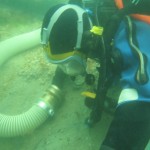 Dave Parham and Paola Palma (School of Applied Sciences) have been researching the Swash Channel Wreck which lies in approximately 7m of water in the Swash Channel in the approaches to Poole Harbour. The site was discovered as a side-scan sonar anomaly as a result of a geophysical survey conducted by Wessex Archaeology on behalf of Poole Harbour Commissioners and Poole Borough Council. The site has since been designated as a Historic Wreck.
Dave Parham and Paola Palma (School of Applied Sciences) have been researching the Swash Channel Wreck which lies in approximately 7m of water in the Swash Channel in the approaches to Poole Harbour. The site was discovered as a side-scan sonar anomaly as a result of a geophysical survey conducted by Wessex Archaeology on behalf of Poole Harbour Commissioners and Poole Borough Council. The site has since been designated as a Historic Wreck.
 The ship is the subject of a major excavation by BU, supported by English Heritage. It has been dated to around 1630 and includes the earliest ship carvings ever found in the UK, including a mysterious wooden merman, and much of the evidence found on the wreck suggest that it would have been a relatively high status ship for its period.
The ship is the subject of a major excavation by BU, supported by English Heritage. It has been dated to around 1630 and includes the earliest ship carvings ever found in the UK, including a mysterious wooden merman, and much of the evidence found on the wreck suggest that it would have been a relatively high status ship for its period.
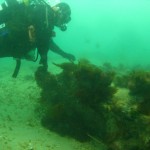 The wreck has been featured on the One Show (6 April 2011) where presenter Dan Snow took part in a dive on the wreck in the mouth of Poole Bay alongside a team of BU Marine Archaeologists, led by Dave.
The wreck has been featured on the One Show (6 April 2011) where presenter Dan Snow took part in a dive on the wreck in the mouth of Poole Bay alongside a team of BU Marine Archaeologists, led by Dave.
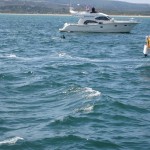 Dave will also feature in the fourth episode of Britain’s Secret Seas, The Bustling South, on 29 May at 8pm on BBC2.
Dave will also feature in the fourth episode of Britain’s Secret Seas, The Bustling South, on 29 May at 8pm on BBC2.
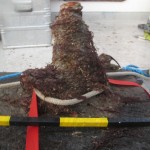 After conservation, finds from the Wreck and all the information from the excavation will be passed on to Poole Museum Service to be displayed to the community.
After conservation, finds from the Wreck and all the information from the excavation will be passed on to Poole Museum Service to be displayed to the community.
PGR Poster Events
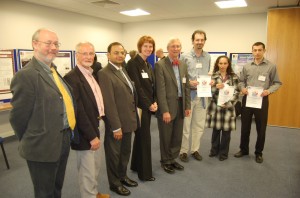
Post Graduate Researcher Poster Events
At School level we will shortly be holding a Post Graduate Poster event on the 18th May. This was an initiative that started five years ago following a suggestion from a PGR student representative. Various poster events are organised specifically for PGR only participation, at national level such as the young engineer of the year competition at the Houses of Parliament, at university level organised by the Graduate School and at academic group level such as the new Psychology event. It is worth thinking about these activities and the value to the academic community at various levels.
Our PGR poster event is organised with the help of a small number of staff but the main decision making regarding the format of the event is driven by the PGR community itself. The posters compete for a small cash prize within year groups and are judged externally by invited high-profile industrialists and academics. Participation level has been high during the four events to date and the event ownership for the participating PGR’s has been maintained. External participation to judge the posters has been appreciated by the PGR’s as the economic and practical benefits of research are seen as valued. In addition, the enthusiasm for the research projects from the external competition panel act as a real motivation to students and supervisors. Our key values that keep the poster conference successful are retaining the PRG ownership concerning format and external engagement via the competition judgment of the posters.
Prof Mark Hadfield
Deputy Dean – Research and Enterprise
School of Design, Engineering and Computing











 REF Code of Practice consultation is open!
REF Code of Practice consultation is open! BU Leads AI-Driven Work Package in EU Horizon SUSHEAS Project
BU Leads AI-Driven Work Package in EU Horizon SUSHEAS Project Evidence Synthesis Centre open at Kathmandu University
Evidence Synthesis Centre open at Kathmandu University Expand Your Impact: Collaboration and Networking Workshops for Researchers
Expand Your Impact: Collaboration and Networking Workshops for Researchers ECR Funding Open Call: Research Culture & Community Grant – Apply now
ECR Funding Open Call: Research Culture & Community Grant – Apply now ECR Funding Open Call: Research Culture & Community Grant – Application Deadline Friday 12 December
ECR Funding Open Call: Research Culture & Community Grant – Application Deadline Friday 12 December MSCA Postdoctoral Fellowships 2025 Call
MSCA Postdoctoral Fellowships 2025 Call ERC Advanced Grant 2025 Webinar
ERC Advanced Grant 2025 Webinar Update on UKRO services
Update on UKRO services European research project exploring use of ‘virtual twins’ to better manage metabolic associated fatty liver disease
European research project exploring use of ‘virtual twins’ to better manage metabolic associated fatty liver disease